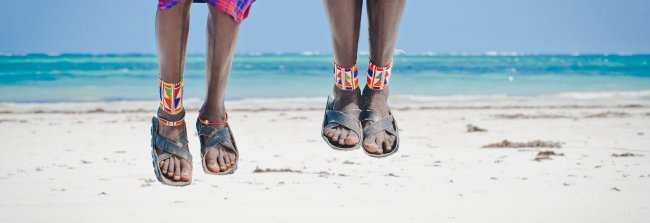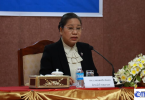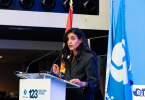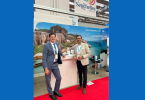WTM London 2019 – the event where ideas arrive – saw a variety of interesting talks and conferences focused on making travel more inclusive.
In a session called Access for All: Using Social Media for Travellers With Disabilities, travellers explained how apps and other tools are helping them to see more of the world.
Disability blogger and journalist Sassy Wyatt said: “Buildings can be made accessible, allowing tourism to become even more accessible. We just need to start on the people that pay the money. I feel that there is a need to employ people like us – those with disabilities who at the forefront can speak candidly about their experiences.”
This session was followed by a fascinating talk that was hosted by Puerto Rico in the Americas Inspiration Zone.
Puerto Rico’s new destination marketing organization will promote the Caribbean island to LGBTQ holidaymakers as part of a drive to boost its economy.
A former Spanish colony that is now a commonwealth of the USA, Puerto Rico was hit by the Zika virus in 2016 and hurricanes in 2017.
Leah Chandler, Chief Marketing Officer at Discover Puerto Rico, told an LGBTQ seminar at WTM London – the event where ideas arrive – that there is huge potential for tourism.
“It is just 6.5% of GDP, which is very small for a Caribbean destination,” she told delegates.
“Inclusivity is built into our DNA, but the Caribbean is not known for gay travel – some islands criminalise homosexuality. We will be the LGBTQ capital of the Caribbean.”
She outlined the island’s strategy, which saw research and training about the LGBTQ market, ahead of a plan to market to the gay community.
The seminar also heard from Dana Artz, Sustainability Manager at online platform Evaneos, which works with 1,300 destination management companies around the world.
It is working with LGBT consultancy OutNow to train the DMCs about LGBT travellers and how tours can be tailored to each customer’s needs.
Ian Johnson, founder of Out Now, said the global LGBT market is worth $218.7 billion a year, moderated the seminar.
He said LGBT holidaymakers are as diverse as the mainstream travel sector, and urged destinations and hoteliers to research the market and train their staff about LGBT tourism.
The speakers at the seminar agreed that LGBT tourism is becoming less of a niche sector and is being incorporated into general marketing and advertising.
Furthermore, LGBT travellers are becoming increasingly concerned about sustainability, climate change and their carbon footprint, said Johnson.
WTM London also saw a crucial piece of inclusive travel research revealed as the UNWTO revealed the second global report on Women in Tourism.
The research, commissioned by UNWTO, shows 54% female employment in global tourism in 2019, well ahead of 39% in the broader economy.
However, it also reveals women in travel are paid an average 14% less than men. They are also far less likely to have management positions, for instance only 23% of current tourism ministers are women – up a modest three per cent from the first report in 2010.
The research also highlighted positive case studies of women who had been empowered in travel careers.
UNWTO intends the report to be used as a blueprint for creating opportunities for women in the sector, breaking down legal, structural and financial barriers and building up confidence.
The results will be further discussed at UNWTO’s first conference on the subject of women in travel, coming up in Ghana.
UNWTO secretary general Zurab Pololikashvili said: “we need more investment, more jobs and more innovation. Let’s continue, using this report like our guide.”
Meanwhile, in a session entitled Technology is a Girl’s Best Friend, delegates heard soon to be published University of Surrey research which revealed in the 55 most important tourism companies in the world, the higher the technological remit of the company, the lower women’s participation was in management.
In a panel discussion, Diana Munoz-Mendez, senior VP of global tourism partnerships at Mastercard, pointed out future jobs were likely to be increasingly technology based and said attitudes taught at home and school were important.
“If women are not in tech, how are we going to keep up with the exponential growth in jobs in technology?”
She added that if women weren’t involved in designing algorithms, consumer products were unlikely to suit a truly diverse audience.
Mo Talukder, director of sales for Geotourist, said women should not be put off by the perceived high levels of knowledge required for a tech career because, “an enormous amount of jobs in tech don’t require coding.”
She also pointed out that the proliferation of smart phones should be helping to make women more comfortable with technology.
On this very theme, travel and tourism businesses in Africa need to do more to empower the women who make up a large percentage of their workforce.
Alessandra Alonso, founder of Women in Travel, said more than 30 million women work in tourism in Africa but there was only “a limited presence” at the higher levels.
Also, she said those women she spoke to who had started their own enterprises had struggled due to lack of networking opportunities.
Fellow panellist Sthembiso Dlamini, acting CEO of South African Tourism, agreed that tourism is a very important growth sector in South Africa, which has 30% unemployment.
Some 70% of people employed in South Africa tourism are women, but they often struggle to progress beyond entry level jobs, she said.
South Africa Women in Tourism has a management development programme for women working in the travel industry, but Dlamini said it was also important to empower women working in the communities.
Citing South Africa’s Kruger National Park as an example of ways in which tourism businesses can help women, she said: “Kruger is surrounded by communities, so how do we ensure that the most famous products sitting in Kruger are sourced from local women?
“Women can own laundries and Kruger can take their laundry into the communities to be done; you have culinary experiences in those communities, so how can we make sure our visitors experience that?
“People want immersive experiences, they want to do what the locals are doing, we should be telling tour operators to come into the communities, understand what they are offering so you can offer these experiences to your clients.”
Zina Bencheikh, regional general manager of EMEA of Peak destination management company, told WTM they had introduced a programme to recruit more women guides after realising that although 60% of its payroll was female, it wasn’t doing enough to attract female guides.
“A lot of people working in high-level positions start as guides, so we need to give women the opportunity to work as guides,” she said. “We created goal to double the number of female guides within four years, by 2020, but have already reached that goal.”
Amelia Diaz, a tourism development specialist at the International Trade Center, has also worked with young women to help them become guides. “It empowers them, gives them a voice and gives them transferable skills; these are the beauties of tourism,” she added.
In Gambia, Diaz has worked on a four-year project to spread tourism from coastal areas up country. “Most of the women were living in rural communities and they couldn’t access the training institutions at the coast, which is why they decided to drive tourism up country to bring the skills to their homes,” she said.
Abigail Mbalo, head chef and founder of 4Romed eKasi Culture who works in under-privileged townships to boost the economy through food tourism, added: “We have a lot of talent and creativity in South Africa; it is there in us, all we need is support.”
eTN is a media partner for WTM London.






